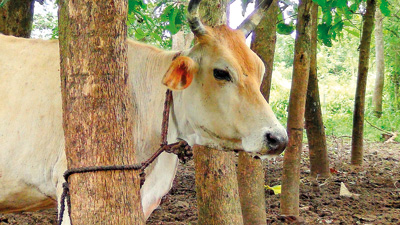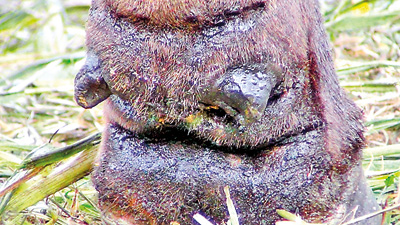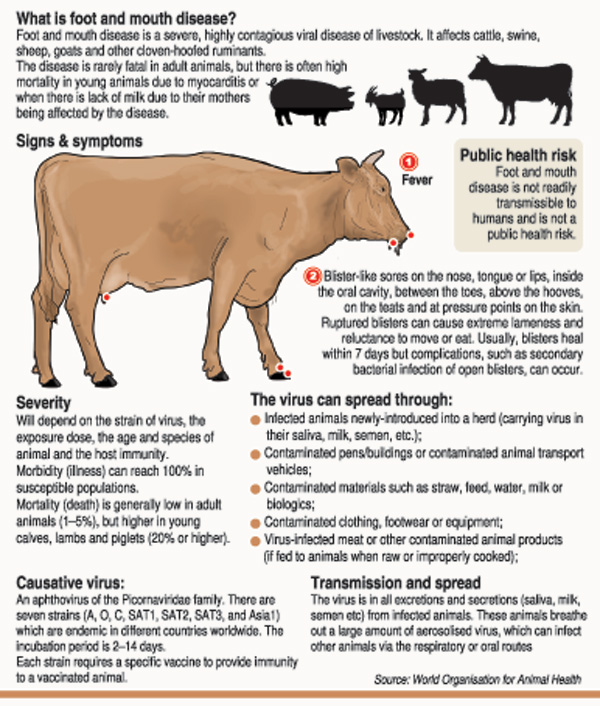News
Foot and mouth wanes in Kurunegala but waxes in Puttalam
Assuring that strong measures are being taken to contain and prevent the spread of foot and mouth disease which has hit cattle in the North Western Province (NWP), a high level official urged that all transport of cattle should be carried out only after stringent checks to ensure that the animals are not ill.

From both the Kurunegala and Puttalam districts, the number of animals affected by foot and mouth disease has been reported as around 20,000. Pix by Hiran Priyankara Jayasinghe
Charitable organisations which transport and donate cattle to farmers should be cautious and get such cattle checked by the government’s veterinary authorities, reiterated the Acting Director-General of the Department of Animal Production and Health, Dr. Ranjani Hettiarachchi.
Explaining the repercussions of transporting and distributing animals which may be affected, she pointed out that even if one or two diseased animals are given to a farmer, his whole herd would get affected. The disease also spreads along the way.
“This is a major concern for us and we need the support of the police and other authorities to prevent the spread of foot and mouth disease,” Dr. Hettiarachchi told the Sunday Times.
Pointing out that currently there is a prohibition on the transport of cattle from one area to another within the NWP and also out of the NWP, the department’s Additional Provincial Director, Dr. B.C.S. Perera, said that the issuance of permits for cattle transport was suspended in early November. 
A permit is needed to transport cattle from division to division, it is learnt.
Referring to the action taken in the NWP, Dr. Perera said that 80 percent of the cattle in the province have now been vaccinated as a prophylactic measure (to prevent disease). Other animals such as pigs and goats are also being re-vaccinated. This was in addition to the normal vaccination programme carried out by the regional veterinary surgeons in June-July.
“As the dairy farmers are getting affected by the drop in milk production, we are also working with companies buying milk from them to provide the medications necessary for the management of this disease free of charge to the farmers,” he said.
Highly contagious, is how Dr. Perera describes foot and mouth disease, a viral infection which could be caused by one of seven strains. The predominant strain in Sri Lanka since 2014 has been ‘O’ but now tests are being carried out to determine whether there is a mutation of the virus.
“The current infection which began in late September in Horambewa is suspected to have been set off by a diseased animal brought from the North Central Province which first affected the non-vaccinated cattle in Horambewa. Later, however, as the disease spread some of the vaccinated animals had also been affected, but the virulence of the illness was less than in the unvaccinated animals,” he said.
Looking at the NWP’s two districts, Dr. Perera says that the spread began in the wet zone of the Kurunegala district and then moved to the dry zone of the same district. Now it is on the wane in this district but many cases have been reported from the Puttalam district.
After studying the data, he disclosed that the disease seems to have affected only a small number. The total cattle population of the NWP is nearly 210,000, while from both the Kurunegala and Puttalam districts, the number of animals affected by foot and mouth disease has been reported as around 20,000. So far, the direct deaths reported due to this illness are about 30 of which around 20 are calves.
Citing the example of Katupotha and Bamunakotuwa where he was on a field visit when the Sunday Times contacted him on Friday, Dr. Perera said that even in these badly-hit areas, there have been only about nine deaths.
The NWP is a high-yielding milk area, with the usual production being 200,000 litres a day. Last August, there had been a collection of about 85,000 litres a day from Katupotha alone which has now dropped by about 20% due to the foot and mouth disease. This is why there is much concern and worry among dairy farmers, he points out, adding that all measures are being taken to alleviate their fears.
“We have been working with companies which collect milk from these areas to fund the medications needed to bring the disease under control, while also conducting public awareness campaigns on how the farmers should manage the period when the animals are ill and even after that,” he said.
When the animals have high fever, they tend to stop eating because of the blisters in their mouth and become weak. This is also the time when the milk production reduces. So there is a need to manage and bring down the high fever and once that and the other symptoms are under control, we advise the farmers on how to continue giving proper nutrition. The disease in the Kurunegala district is waning and now we are getting into the convalescence period, added Dr. Perera.
| Biggest buyer of local fresh milk chips in to help the farmers, while assuring consumers of strict quality checks | |
| Working closely with officials of the Department of Animal Production and Health, the biggest buyer of local fresh milk from dairy farmers in the country, Cargills Quality Dairies (Private) Ltd., has been extending much support to those affected by the foot and mouth disease spreading among cattle in the North Western Province. The company’s Milk Production and Dairy Development Manager, Dr. R. Mahendra who is a Veterinary Surgeon told the Sunday Times that they can assure consumers that there is absolutely no contamination in their liquid milk and other dairy products. Firstly, the foot and mouth disease among cattle, although highly contagious, does not cause illness in humans, he says, pointing out that it is not a zoonotic disease. This means that this infectious disease caused by a virus does not pass from animals to humans. The World Organisation for Animal Health states that foot and mouth disease, which affects cloven-foot ruminants such as cattle, swine, sheep and goats “is not readily transmissible to humans and is not a public health risk”.(A ruminant is an animal which brings back food from its stomach and chews it again.) Dr. Mahendra commends the dairy farmers who form part of their collection network in the area for not milking the ill cows. “We also do stringent testing to ensure that the milk we collect is of the highest quality. We can give people a 100% guarantee that the liquid milk and dairy products such as yoghurt, cheese and butter that we put on the shelves for the consumer come with quality assurance.” From the extensive network of farmers in the NWP, Cargills Quality Dairies (Private) Ltd., usually collects about 40,000 litres of fresh milk per day. When this highly-infectious disease hit the area, the company got into action immediately and supported the Department of Animal Production and Health to carry out what is called “ring” vaccination to curb the spread, he said, adding that those animals which had been previously vaccinated got milder disease and unvaccinated animals got severe disease. “We provided the authorities a package of about Rs. 1.1 million for distribution among farmers which included anti-histamines and hoof-spray to manage the viral symptoms and blisters and antibiotics to prevent a secondary bacterial infection,” he said. Dr. Mahendra added that the dairy farmers in the area are badly affected economically due to the drop in milk production currently caused by the foot and mouth disease and earlier by the drought followed by heavy rains which led to floods. |


